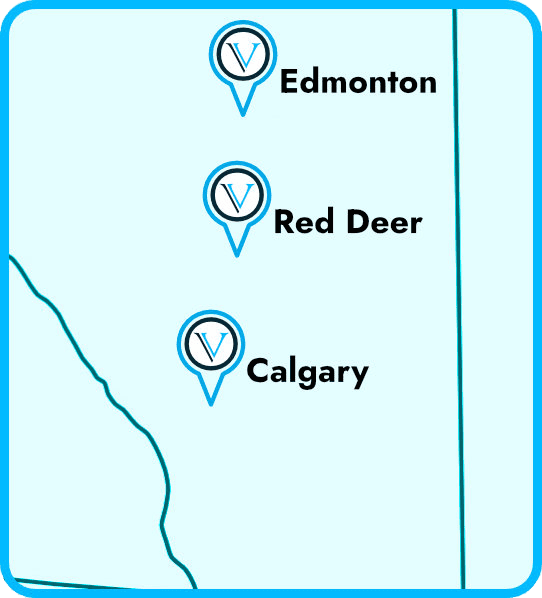
What would happen to your assets if something suddenly happened to you?
As tough a question as that is to confront, it is one that almost every adult in Calgary should ask sooner rather than later.
As soon as we have accrued any assets, started a family, and started to build wealth, an estate plan becomes a logical step to take.
So why do so many people leave it so late? Sometimes too late?
Perhaps it’s because nobody likes to consider a time when we are incapacitated or no longer here.
It’s important to tackle the issue head-on. We don’t know what lies around the corner, so taking some essential estate planning steps makes sense.
Here we share why estate planning is so important and the steps you need to take to start protecting your assets and your loved ones.
Learn More → What Will Happen If You Die Without a Will in Alberta?
What is estate planning, and why do you need it?
Careful estate planning allows you to maintain control over what happens to you and your assets if you are either incapacitated or pass away.
Writing legal documents helps you distribute assets tax effectively before and after you die – and much more besides.
Through these estate planning documents, you can nominate trusted individuals to make financial and health decisions on your behalf if you become incapable of doing so and ensure that your personal wishes are followed as you age.
Estate planning also ensures that your preferences regarding dependents are taken care of.
Why create an estate plan or will in Alberta?
Failing to prepare for life’s most serious situations can make things very difficult for you and your loved ones.
With no estate plan at all, the following situations may beset the family:
- Loved ones will be left confused about your intentions, wishes, and preferences regarding healthcare and aged care matters
- Family members may have to apply to the court for guardianship or trusteeship to make decisions on your behalf
- Your assets could be distributed by the court after your death according to local Alberta estate laws
- Disputes could develop between family members
- Loved ones may have to settle debts and be financially impacted by your death
- Your business may need to close or suspend trading due to the lack of a succession plan
- You pay more taxes when transferring assets – less of your estate ends up with those you love
- An unprepared family member may have to administer your estate
Without an estate plan, loved ones may be left with difficult and stressful decisions to make regarding financial and personal issues.
What are the main considerations before estate planning?
We’ll get into the steps for creating an estate plan below but first consider the following questions:
- What are the financial needs of surviving family members?
- Do you have any dependents with specific or special needs?
- Which individuals could you trust to make important decisions on your behalf?
- What are your financial, contractual and moral obligations with your estate?
- How can you create a business succession plan?
- How can you minimize tax when transferring assets?
- Are all your assets in Alberta or do you possess interstate assets?
- Do you want to leave a charitable donation as part of your legacy?
With the help of experienced estate planning lawyers, it’s generally much easier to ask these difficult questions and make informed decisions that accurately reflect your wishes.
When should you start your estate plan?
There are both practical and emotional reasons for starting an estate plan as soon as you have assets to your name, start a family, own a business, and start to build wealth.
You want to protect your family and don’t want to see your wealth eroded by unnecessary taxes.
If you have already retired without an estate plan, these reasons become even more compelling.
Some people leave it too late. To avoid that scenario, it makes sense to put some initial estate planning documents together as soon as you can.
Remember, nothing you decide is set in stone forever. All details, such as personal representatives, agents, beneficiaries, trustees, and other choices you make can be reviewed and amended at any time providing you retain the capacity to make decisions.
The details of wills, powers of attorney, personal directives, trusts, and so on can be changed according to life circumstances. Indeed, it is good practice to review them regularly.
The hardest part for most people is getting started on an executable estate plan but it does not need to be complicated.
What are the main documents in an estate plan?
WILLS
A will details how your assets are distributed after death and may also specify how dependents should be cared for. It also names a personal representative to look after your estate.
POWER OF ATTORNEY
An enduring power of attorney empowers another trusted and capable adult (usually a close family member or friend) to legally make financial decisions on your behalf if you are no longer capable of doing so.
PERSONAL DIRECTIVE
A personal directive empowers another trusted and capable adult (usually a close family member or friend) to legally make personal (non-financial) decisions on your behalf if you are no longer capable of doing so.
TRUSTS
Trusts allow you to transfer property tax-effectively to a third-party to hold for a beneficiary such as a minor child or incapacitated loved one, allowing them to benefit from your assets without necessarily being the legal owner.
How to develop an estate plan in Alberta
A few simple steps can help you build a legally executable estate plan that accurately reflects your wishes.
1. Determine your main estate planning goals
Most people have similar goals with estate planning but everyone’s situation is slightly different.
It’s important to define what you most want your estate plan to achieve. Is it the protection of dependents, the tax-efficient transfer of assets, concerns about aged care? All three of these or other reasons?
Everyone creating an estate plan wants peace of mind but many strategies exist to get you there.
2. Seek professional advice
An estate planning lawyer, financial advisor or accountant can provide valuable input as you start to formulate your estate plan.
Talk your main goals through with your advisor. A professional can answer your questions and identify important issues that you may not yet have considered.
This is especially the case if you own a business, as this may require a professional evaluator, advisory board, or family council.
3. Share your estate plan with your family
The input of adult family members is crucial – especially if individuals are expected to perform specific duties if you become incapacitated or pass away, or are expected to inherit a business.
Certain sentimental assets may be important to some family members – and their wishes should be taken into account.
While this can be tough to discuss, it’s important to ensure that everyone is clear about the decisions you make and is comfortable with them.
4. Make special arrangements as a business owner
As well as the standard estate planning documents like a will, enduring power of attorney and personal directive, business owners will need to consider other aspects for a comprehensive estate plan.
Life insurance is especially important for a business owner if the business would struggle to operate without you.
You should also implement a succession plan that passes your business on to a partner or family member or allows you to sell up.
Quick, impulsive decisions about businesses can cost a lot of money. Following a considered plan will help you exit the business on your terms.
5. Create executable estate planning documents
Once you have received the necessary input from others and made the key decisions regarding your estate plan, work with an estate planning lawyer to draw up the right documentation.
The stakes are high when it comes to financial decisions, transferring assets and nominating various beneficiaries, agents, personal representatives, and so on. These documents need to be error-free, legally enforceable, and accurately reflect your true wishes.
6. Review your plan from time to time
As you grow older, relationships, opinions, and finances may change, so your estate plan must reflect these changes.
Amendments to wills, powers of attorney, personal directives, trust agreements, and other estate planning documents must be made professionally to be legally enforceable.
The younger you are when you make your original estate plan, the more important it is to regularly review it.
Speak to Vest Estate Lawyers for advice and assistance with creating your estate plan. Start with a one-on-one consultation.

We currently have three offices across Alberta — Edmonton, Calgary, and Red Deer. However, we serve the entire province of Alberta. We also have the infrastructure to work with any of our clients virtually — even the furthest regions of Alberta.
Call us toll-free at 1-877-448-3131 to get routed to the best office for you or contact us online to schedule an appointment.
We also have a dedicated intake form to help you get the ball rolling. Our intake team will review your specific case and advise you on the next steps to take and what to expect moving forward.
Our offices are generally open 8:30 a.m.—5:00 p.m., Mon—Fri.


Sarah Levine
WILLS and ESTATES LAWYER
Sarah Levine is a lawyer in the firm’s Edmonton office. She carries on a varied practice, focusing on all forms of estate planning and estate administration.

